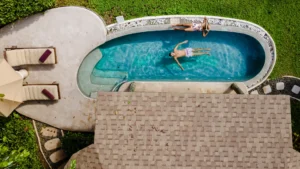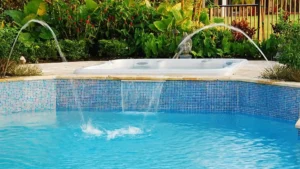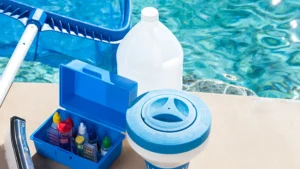
In some parts of the United States, afternoon storms happen often. You can almost tell when they will come, like looking at a clock. However, these storms can make your swimming pool water cloudy. This is not good for swimming or relaxing.
Don’t worry if your pool gets cloudy after a storm, you’re not alone in wondering why is my pool cloudy after a rainstorm. Amenity Pool Services can help clear up your pool water. We make sure it stays clean and balanced for you and your guests.
Why Rain Makes Your Pool Cloudy

We like to think of rain as this pure, aqueous substance from the sky, but that’s only about half true. Yes, rainwater is as pure as it’s going to get when it’s held within the clouds.
But the second it starts raining, that water becomes dirtier and dirtier before it hits the ground. That’s because rain picks up impurities in the air, including:
- Pollen
- Dust particles
- Dirt Nitrates
- Phosphates from air pollution
Rain can make the water more acidic. This is good for your garden, but not for your pool. Here’s why: You want your pool water to be a little basic. The CDC advises maintaining a pH level between 7.0 and 7.8, with a minimum chlorine concentration of 1 ppm for pools and at least 3 ppm for hot tubs.
However, according to the EPA, clean, natural rain typically has a pH between 5.0 and 5.5, making it slightly acidic, so if it rains a lot, this can drop your pool’s alkalinity and weaken the cyanuric acid.
Plus, it raises the calcium hardness in your pool, which can make the water cloudy. You can’t completely prevent rainwater from damaging your pool chemistry and making your pool cloudy, but you can take a lot of steps to prevent it from getting out of hand.
How to care my pool when is raining?

- Prepare your pool if a storm is approaching.
- Ensure the water chemistry is balanced before the storm.
- Keep the pool pump running after the storm.
- Turn off the pool pump during the storm to avoid electrical hazards or damage.
You might think about topping your pool with a cover before a storm to mitigate the chemical change, but that’s wishful thinking. Unlike hot tub covers, pool covers are designed to keep water in the pool, not out.
You might get some results from a solid, retractable pool cover, but that might cost more than it’s worth to you. With really heavy rains, you’ll probably need to shock your pool, but you might need a pool shock that doesn’t contain calcium if the hardness level is too high, which would be about 180–220 ppm.
Other pool problems may present other than your pool being cloudy after a rainstorm, which we’re not covering here.
If that’s the case, give us a call, and we can help you clear out the clouds!
Can you swim in cloudy weather?

It is generally considered safe to be outdoors under clear weather conditions; however, it is important to be cautious and vigilant if a storm begins to develop.
In addition, you should be mindful of the potential for sunburn. Even on overcast days, harmful rays that can lead to sunburn may still penetrate through the clouds and affect your skin. Therefore, it is advisable to take protective measures, such as applying sunscreen, even when it does not appear to be sunny outside.
FAQs About Cloudy Pool Water After a Rainstorm
1. Why is my pool cloudy after a rainstorm?
Rainwater comes with contaminants like pollen, rain dust, dirt, and phosphates that could all affect your pool. The rainwater lowers the pH and alkalinity of your pool, diluting other necessary chemicals like cyanuric acid and chlorine. This imbalance makes it hard for the chlorine to kill what is in the water. Cloudy water can develop shortly after the rainstorm.
2. How does rainwater affect my pool’s chemistry?
Rainwater messes with the water’s balance, making chlorine less effective and bumping up the calcium levels, which is why your pool water gets all murky.
3. Why is my pool cloudy and foamy?
So, if you’re wondering why your pool’s looking all murky and bubbly, it could be because of rain bringing in all sorts of yucky stuff, and maybe your pool’s chemistry’s a bit off. Too much organic stuff, dirty air, and not enough sanitizer usually lead to a cloudy and foamy mess.
4. How to clear cloudy pool water fast after rain?
Start by running your pump continuously for 24 to 48 hours. Test the water and balance pH, alkalinity, and sanitizer levels. If needed, use a non-calcium–based pool shock to avoid further hardness issues. For Port Charlotte residents, local professionals like Amenity Pool Services can handle the process efficiently and quickly.
5. Is it a good idea to put a cover on my pool when it's raining?
Most pool covers are made to hold water in, not let it escape. A good, foldable pool cover could cut down on dirt and stuff, but it might cost too much for the perks it gives. Instead, make sure your pool’s ready for storms and fix it up afterward.
6. Can we keep the pool pump on when there's a storm brewing?
No. The idea is to shut off your pump when the storm’s happening to keep you safe from any electrical risks.
7. Should I be shocking my pool after every time it rains?
Not always. But if it’s been raining a lot or the water looks all murky, giving the pool a good shock is a smart idea. If you’re in Port Charlotte, Miami or Dallas and your pool’s water’s looking all murky or foamy, Amenity Pool Services can swoop in and give it a good clean and balance it up fast, so you can get back to your summer fun.






